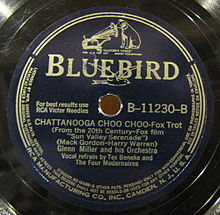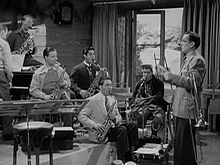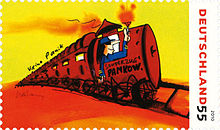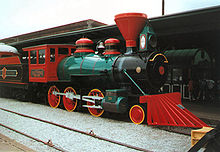- Chattanooga Choo Choo
-
For the 1984 film, see Chattanooga Choo Choo (film). For the hotel and convention center in Chattanooga, Tennessee, see Terminal Station (Chattanooga).
"Chattanooga Choo Choo" 
"Chattanooga Choo Choo" coverSong by The Glenn Miller Orchestra Published 1941 Recorded 1941 Genre Big band, swing Language English, German, Italian
(see other versions)Writer Mack Gordon Composer Harry Warren Music sample "Chattanooga Choo Choo"A recording by the Glenn Miller AAF Orchestra (with Ray McKinley and The Crew Chiefs on vocals) for the Swing Shift radio broadcast"Chattanooga Choo Choo" is a song by Harry Warren (music) and Mack Gordon (words). It was recorded in a big-band/swing manner by Glenn Miller and his orchestra and featured in the 1941 movie Sun Valley Serenade, which starred Sonja Henie, John Payne, Glenn Miller and his orchestra, The Modernaires, Milton Berle and Joan Davis. The song was performed in the film as an extended production number, featuring vocals by Tex Beneke, Paula Kelly, and the Modernaires, followed by a production number showcasing Dorothy Dandridge and an acrobatic dance sequence by The Nicholas Brothers. The Glenn Miller recording, RCA Bluebird B-11230-B, became the #1 song across the United States on December 7, 1941, and remained at #1 for nine weeks on the Billboard Best Sellers chart.
The 78-rpm commercial version of the song was recorded on May 7, 1941 for RCA Victor's Bluebird label and became the first to be certified a gold disc on February 10, 1942, for sales of 1,200,000. The transcription of this award ceremony can be heard on the first of three volumes of RCA's "Legendary Performer" compilations on Glenn released by RCA in the 1970s. In the early 1990s a two-channel recording of a portion of the Sun Valley Serenade soundtrack was discovered, allowing reconstruction of a true-stereo version of the film performance.
In 1996, the 1941 recording of "Chattanooga Choo Choo" by Glenn Miller and His Orchestra was inducted into the Grammy Hall of Fame.
 "Chattanooga Choo Choo, run it down again" – Glenn Miller (right) and his orchestra perform the song in Sun Valley Serenade. Tex Beneke is to the left of Miller
"Chattanooga Choo Choo, run it down again" – Glenn Miller (right) and his orchestra perform the song in Sun Valley Serenade. Tex Beneke is to the left of Miller
The song was written by the team of Mack Gordon and Harry Warren while traveling on the Southern Railway's Birmingham Special train. The song tells the story of traveling from New York City to Chattanooga. However, the inspiration for the song was a small, wood-burning steam locomotive of the 2-6-0 type which belonged to the Cincinnati Southern Railway, which is now part of the Norfolk Southern Railway system. That train is now a museum artifact (see below). From 1880, most trains bound for America's South passed through the southeastern Tennessee city of Chattanooga, often on to the super-hub of Atlanta. The Chattanooga Choo Choo did not refer to any particular train, though some[who?] have incorrectly asserted that it referred to Louisville and Nashville's Dixie Flyer or the Southern Railway's Crescent Limited.
Contents
Cover versions
- Cab Calloway and His Orchestra recorded a cover version of "Chattanooga Choo Choo" on the Conqueror record label in 1941 as Conqueror 9914.
- Carmen Miranda recorded a cover on July 25, 1942 and sang in the movie Springitme in rockies
- Bill Haley & His Comets released a cover of "Chattanooga Choo Choo" as an Essex 45 single in 1954 as Essex 348.
- There is a 1962 single version by pianist Floyd Cramer on RCA Records.
- In 1964, UK instrumental group The Shadows recorded a version of the song for their album Dance With The Shadows which reached number two in the UK album charts.
- In 1967, the American musical group Harpers Bizarre released a cover version of the song "Chattanooga Choo Choo", which reached #45 on the U.S. pop chart and spent two weeks at #1 on the Easy Listening chart.[1]
- In 1975, Haruomi Hosono released a Japanese language cover of the song as the opening track to his album Tropical Dandy.
- In the 1970s, the tune was used in the UK on an advert for Toffee Crisp candy bars, starting with "Pardon me, boy, is that a Toffee Crisp you chew chew," and ending with the final punch line "Chew chew Toffee crisp, the big value bar."
- A cover by Steve Lucky & The Rhumba Bums featured in the film Be Cool (2005).
- The song's iconic intro was sampled by That Handsome Devil in their song "Damn Door" on the debut album "A City Dressed in Dynamite." (2008)
Versions in German and Dutch
The tune was adopted twice for German songs. Both songs deal with trains, and both songs start with (different) translations of "pardon me".
The first was created and performed in 1947 by the German pop singer Bully Buhlan (Zug nach Kötzschenbroda). The lyrics are humorously describing the bother of a train ride out of post-war Berlin: no guarantee to arrive at destination due to coal shortage, passengers travelling on coach buffers, steps and roofs, never-ending trip interruptons including a night stop for delousing.
The second, Sonderzug nach Pankow, created by the German rock musician Udo Lindenberg in 1983 became very popular and had various political implications. Lindenberg was a western German singer and songwriter with a suitable fan community in the east.[2] He had applied for years to tour the GDR but was rejected several times.[2] The 1983 cover version of the Glen Miller Classic was directly asking GDR's Chairman of the Council of State Erich Honecker for allowance for a concert in the Palace of the Republic (Berlin).[2] It was released on 2 February 1983 and was repeatedly featured in western media available as well in the east. The song itself and the Glenn Miller original were temporarily interdicted in the GDR. Just playing the first keys could cost a job.[2] Nevertheless Lindenberg finally succeeded in getting an invitation to the GDR rock festival Rock for Peace on October 25, 1983. Honecker, a former brass band drummer of Rotfrontkämpferbund and Lindenberg 1987 exchanged presents in form of a leather jacket and a metal shawm.[3] Lindenberg's success to pass the Inner German border peacefully with a humorous song gave him celebrity status and as well a positive political acknowledgement in both parts of Germany.[2]
Lindenberg's version was adapted by Dutch singer Willem Duyn as De Eerste Trein Naar Zandvoort ("First train to Zandvoort") chronicling chaos and mayhem on the first seaside train (which he chooses to miss). It was a hit in the summer of 1983.
Legacy
Today, trains have pride of place in Chattanooga's former Terminal Station. Once owned and operated by the Southern Railway, the station was saved from demolition after the withdrawal of passenger rail service in the early 1970s, and it is now part of a 30-acre (12-hectare) resort complex, including the Chattanooga Choo-Choo Hotel, and numerous historical railway exhibits. Hotel guests can stay in half of a restored passenger railway car. Dining at the complex includes the Gardens restaurant in the Terminal Station itself, The Station House (which is housed in a former baggage storage room) and the "Dinner in the Diner" which is the complex's fine dining venue, housed in a restored 1941 Class A dining car. The city's other historic station, Union Station, parts of which predated the Civil War, was demolished in 1973; its site is now an office building housing the corporate offices of the Krystal restaurant chain. In addition to the railroad exhibits at "the Choo Choo", there are further exhibits at Tennessee Valley Railroad Museum, in the suburb of East Chattanooga.
The reputation given to the city by the song also lent itself to making Chattanooga the home of the National Model Railroad Association. In addition, the athletic mascot of the University of Tennessee at Chattanooga is a rather menacing-looking anthropomorphized mockingbird named Scrappy, who is dressed as a railroad engineer and is sometimes depicted at the throttle of a steam locomotive.
See also
External links
References
- ^ Whitburn, Joel (2002). Top Adult Contemporary: 1961-2001. Record Research. p. 111.
- ^ a b c d e [[[:Template:Der Spiegel]] "Hallo, Erich - Artikel - SPIEGEL-Archiv"]. wissen.spiegel.de. Template:Der Spiegel. Retrieved 2009-06-12.
- ^ No Panic Pictures of the exchanges of presents. Lindenberg later as well presented a guitar with the enscription Gitarren statt Knarren (Guitars not guns) whih was not answered.
Categories:- 1941 songs
- Grammy Hall of Fame Award recipients
- Glenn Miller songs
- Bill Haley songs
- Harry Connick, Jr. songs
- Floyd Cramer songs
- Songs with lyrics by Mack Gordon
- Songs with music by Harry Warren
- Songs about the United States
- Billboard Adult Contemporary number-one singles
- Culture of Chattanooga, Tennessee
- Songs about trains
Wikimedia Foundation. 2010.



